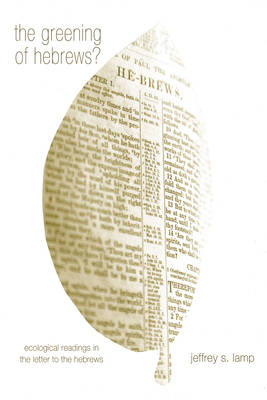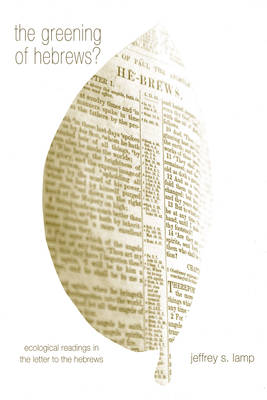
- Retrait gratuit dans votre magasin Club
- 7.000.000 titres dans notre catalogue
- Payer en toute sécurité
- Toujours un magasin près de chez vous
- Retrait gratuit dans votre magasin Club
- 7.000.000 titres dans notre catalogue
- Payer en toute sécurité
- Toujours un magasin près de chez vous
The Greening of Hebrews? Ecological Readings in the Letter to the Hebrews
Jeffrey S Lamp
Livre broché | Anglais
33,45 €
+ 66 points
Description
Synopsis: Applying an ecological hermeneutic developed in the Consultation on Ecological Hermeneutics of the Society of Biblical Literature, and in conjunction with intertextual and theological hermeneutics, Jeffrey Lamp creatively reads the Letter to the Hebrews from the perspective of Earth. The author of Hebrews engages in an extended argument that reinterprets features of the old covenant in terms of the Son in order to demonstrate that the new covenant instituted by the Son is superior to the old. In such an argument, the voice of Earth is understandably absent. The author of the letter is frequently understood as denigrating the temporal order, of which the old covenant is a part, while praising the eternal order, of which the new covenant is a part. An ecological reading of Hebrews demonstrates that, despite the rhetorical concerns of the author, embedded in the argument are textual clues, derived primarily from the christological affirmations of the argumentation, connecting Hebrews with the larger biblical concern for the integrity and care of the created order. Endorsements: "The Greening of Hebrews is a welcome addition to the literature of ecological hermeneutics. Lamp's close reading moves beyond the simplistic discovery of texts about the earth into texts that speak for the earth. Lamp's unique study bridges biblical exegesis and theology, introduces readers to new environmental perspectives, and allows us to hear Earth's voice anew." --Jeffrey W. Barbeau, Wheaton College "The Letter to the Hebrews is a surprising place to attempt an application of an ecological hermeneutic; yet Lamp has done it. Lamp offers a reading of the letter from the perspective of the earth that is fresh, creative, balanced, and--most of all--convincing." --Robby Waddell, Southeastern University "Lamp succeeds in giving the Letter to the Hebrews--an unabashedly christological and anthropocentric work--a voice in the contemporary Christian dialogue on ecology. Using rigorous critical methodology and careful attention to the nuances of the letter's biblical intertextuality, he traces the ecological implications of key texts in Hebrews and opens up tantalizing possibilities for an ecologically sensitive reading of the letter. This innovative study reveals a new trajectory in the interpretation of the Letter to the Hebrews." --Peter Trudinger, Flinders University Author Biography: Jeffrey S. Lamp is Professor of New Testament at Oral Roberts University in Tulsa, Oklahoma. He is the author of First Corinthians 1-4 in Light of Jewish Wisdom Traditions: Christ, Wisdom, and Spirituality (2000).
Spécifications
Parties prenantes
- Auteur(s) :
- Editeur:
Contenu
- Nombre de pages :
- 146
- Langue:
- Anglais
Caractéristiques
- EAN:
- 9781610976558
- Date de parution :
- 11-07-12
- Format:
- Livre broché
- Format numérique:
- Trade paperback (VS)
- Dimensions :
- 150 mm x 226 mm
- Poids :
- 204 g







